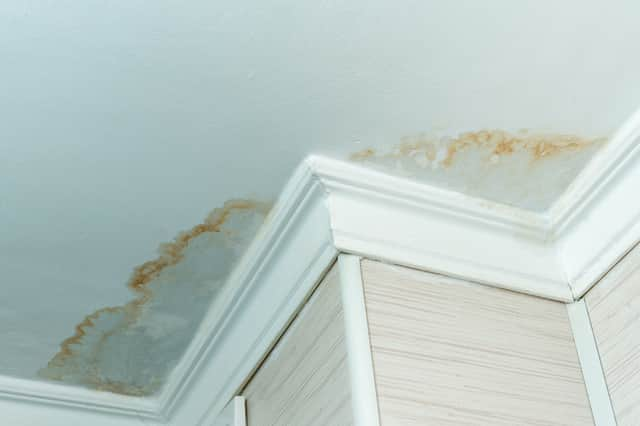Compensation for leaseholder left for two years in flat with leaking roof and water pouring through ceiling


A leasehold tenant has been awarded more than £2000 in compensation after being left in a flat with a leaking roof for more than two years.
The complainant raised an issue with Metropolitan Thames Valley housing association in late 2018 which was still not fully resolved by early 2021, despite water leaking through the roof in most rooms within the property throughout that time.
Leaking ceilings and electrical hazard
Advertisement
Hide AdAdvertisement
Hide AdIn late 2018, the leaseholder reported wet patches on the ceiling in a bedroom and bathroom and requested that the roof be repaired.
For seven months the complainant chased up the landlord, Metropolitan Thames Valley, but received no real response before filing another complaint in autumn 2019 that water had begun to resurface.
At this stage a formal complaint was raised and the landlord said they were aware of the issue, but that as the roof was still under warranty they would need to go through the National House Building Council (NHBC), which had carried out the works.
Over the next year the problem worsened, with water leaking through a light fitting - posing an electrical hazard - and through another ceiling, meaning most of the flat was uninhabitable.
Advertisement
Hide AdAdvertisement
Hide AdIn summer 2020 when contractors eventually attended the property to carry out a leak test, a number of issues were discovered but the problems were not solved.
Indeed, due to problems with the works the issues actually worsened.
During this period it was revealed that the landlord had not in fact contacted the NHBC until more than a year after it had originally claimed.
Even after the necessary works had been carried out, the leaseholder still had issues with leaks, but the property was put up for sale.
‘Severe maladministration’
Advertisement
Hide AdAdvertisement
Hide AdAn initial offer of compensation by the landlord was ruled to have not been sufficient, after the Housing Ombudsman found there was severe maladministration in the landlord’s handling of the reports of a roof leak and maladministration in handling the complaint.
It ordered the landlord to pay compensation totalling £2,150, including increases in initial compensation offered and an additional £1,000 for service failure, distress and the significant level of involvement required by Mr C throughout the matter.
The Ombudsman also ordered the landlord to contact the complainant to obtain copies of his bills to reimburse him for additional water charges and electricity costs incurred as a result of the leak detection and use of the dehumidifier.
Richard Blakeway, Housing Ombudsman, said: “Given the resident’s distress in this situation, the landlord should have maintained communication with him throughout, but failed to do so. It resulted in the resident spending a significant amount of time chasing the landlord for updates and clarity on the next steps and the likely timeline for repair.
Advertisement
Hide AdAdvertisement
Hide Ad“As well as failing to manage the resident’s situation and expectations, there was also a clear record keeping issue. Landlords should appropriately record and retain all notes and reports about a resident’s repair to enable the smooth progression of matters and access by all permitted parties. The landlord failed to do this.
“And while we expect landlords to offer compensation where suitable, in this case greater priority should have been given to putting things right.
“I welcome the opportunity the landlord has taken to learn lessons from this complaint and its actions to improve and prevent similar issues recurring. I would encourage other landlords to consider the learning this case offers.”
In a statement, Metropolitan Thames Valley Housing said: “MTVH acknowledges that our service to the leaseholder in this instance fell well below our usual standards. Our initial response to a leak on this recent development was to engage our repairs contractor rather than to pursue the matter as a latent defect with the developer.
Advertisement
Hide AdAdvertisement
Hide Ad“Our error in mis-assigning the work in the first place stemmed from not having warranty information available to our front line teams. Our error caused delay for the leaseholder and made it more difficult for MTVH to correctly assign ownership to get the matter resolved.
“It is also clear that throughout, our record of proactively providing customers with up to date information was not good. Although the developer has now accepted responsibility for the defect, the leaseholder has had a poor experience throughout.
It added: “We are grateful to the Housing Ombudsman service for the opportunity to identify how MTVH has responded to this determination.
Comment Guidelines
National World encourages reader discussion on our stories. User feedback, insights and back-and-forth exchanges add a rich layer of context to reporting. Please review our Community Guidelines before commenting.
